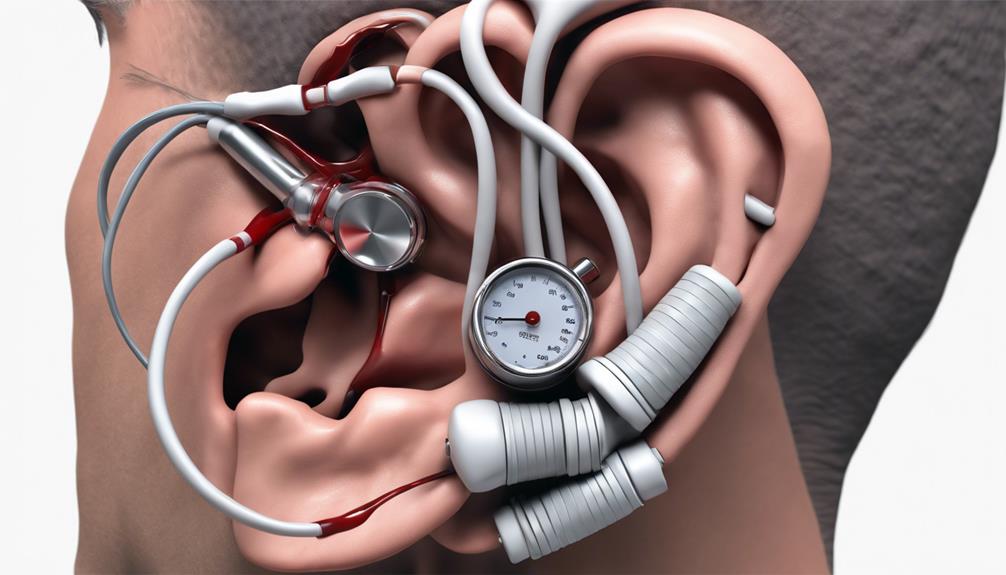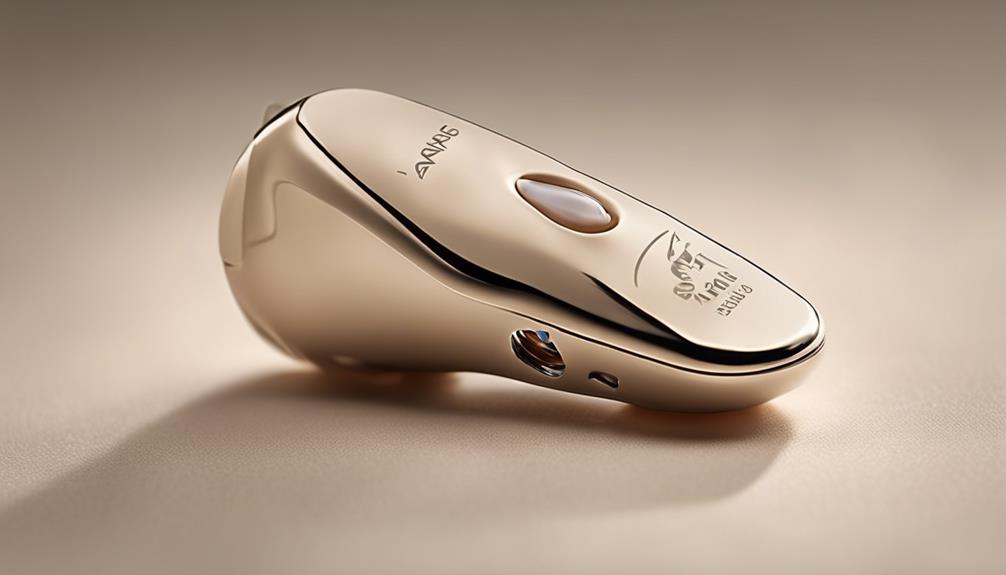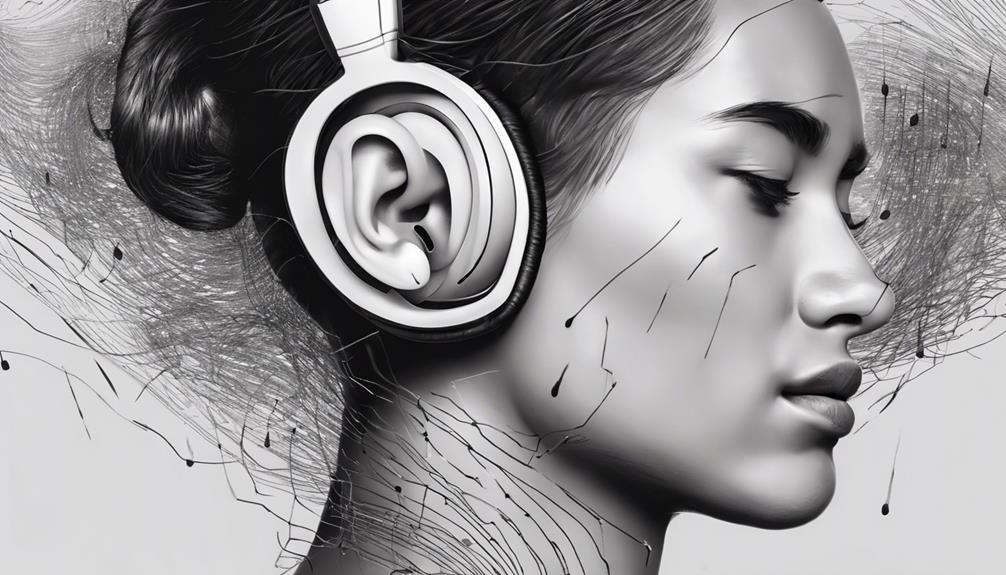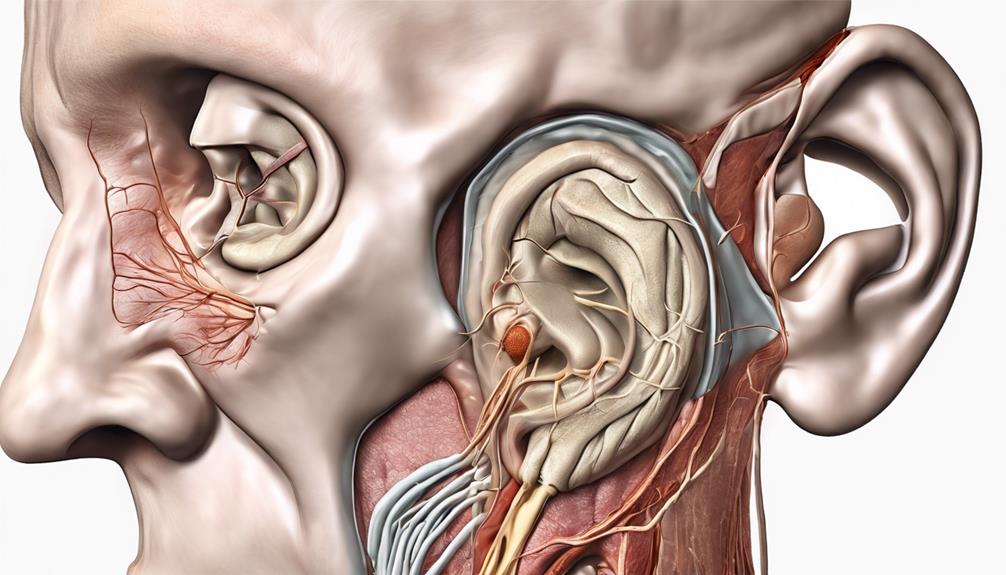The link between high blood pressure and possible hearing loss poses a complicated dilemma as we examine their potential connection. While it is increasingly evident that there is an association between hypertension and reduced hearing, the precise mechanisms by which high blood pressure impacts our auditory abilities remain a topic of interest.
As we unravel the intricacies of this connection, it becomes imperative to explore the nuances of how hypertension may directly influence our ability to perceive sound. The interplay between these two seemingly distinct health domains unveils a complex interrelation that warrants further investigation to fully grasp the implications for our overall well-being.
Key Takeaways
- High blood pressure damages inner ear structures, leading to sensorineural hearing loss.
- Atherosclerosis and thrombus formation disrupt inner ear blood flow, impacting hearing.
- Managing blood pressure is crucial for preserving auditory health and preventing permanent damage.
- Timely interventions to control hypertension can slow down hearing deterioration and reduce associated risks.
Understanding the Hypertension-Hearing Loss Connection
In our exploration of the link between hypertension and hearing loss, studies have indisputably established a strong correlation between these two health conditions.
Hypertension, characterized by high blood pressure, impacts the inner ear microcirculation, affecting the function of the cochlear arteries. This disruption in blood flow can lead to sensorineural hearing loss, particularly noticeable at higher frequencies.
Individuals with grade 3 hypertension often experience a more significant increase in their hearing threshold, indicating a direct relationship between the severity of hypertension and the degree of hearing impairment. Furthermore, conditions associated with hypertension, such as atherosclerosis and thrombus formation in the cochlear arteries, contribute to the decline in auditory function.
Understanding how hypertension influences the inner ear microcirculation and compromises the cochlear arteries sheds light on the mechanisms through which high blood pressure can lead to sensorineural hearing loss, especially impacting the perception of higher frequencies.
Impact of High Blood Pressure on Hearing

Exploring the effects of high blood pressure on hearing reveals a significant risk of permanent damage to auditory organs, impacting sound detection capabilities and potentially signaling underlying health concerns such as stroke risk. Systemic arterial hypertension can lead to microcirculatory insufficiency in the inner ear, causing inner ear hemorrhage and mild sensorineural hearing loss. The association between hypertension and hearing loss is evident, with risk factors for hearing loss including arterial blood pressure levels. Sudden hearing loss may occur due to the sudden changes in blood pressure affecting the delicate structures of the ear, potentially resulting in bilateral hearing loss. The effects of hypertension on the auditory system emphasize the importance of managing blood pressure for overall hearing health.
| Effects of Hypertension | Risk Factors for Hearing Loss | Arterial Blood Pressure |
|---|---|---|
| Permanent damage to auditory organs | Systemic arterial hypertension | Impaired blood flow |
Research Findings on Hypertension and Hearing Loss
Research findings have shed light on the correlation between hypertension and sensorineural hearing loss, revealing significant insights into the impact of high blood pressure on auditory health.
Studies have confirmed a strong association between hypertension and hearing loss, particularly sensorineural hearing loss. Individuals with grade 3 hypertension show a more pronounced increase in hearing threshold, especially at higher frequencies where the impact is most noticeable.
The prevalence of hearing loss among hypertensive patients in the study was found to be 30%. This highlights hypertension as one of the risk factors for hearing impairment.
Furthermore, research suggests that hypertension treatment could potentially slow down the progression of hearing deterioration in affected individuals. Understanding the relationship between high blood pressure and sensorineural hearing loss is crucial in developing strategies for early detection and intervention to mitigate the impact of hypertension on auditory function.
Exploring the Direct Link: Blood Pressure & Hearing

Understanding the direct impact of high blood pressure on hearing health reveals the intricate relationship between compromised blood flow and inner ear structures. High blood pressure can lead to damage in the delicate inner ear structures, particularly affecting the hair cells essential for hearing. This damage can result in cochlear damage, ultimately causing sensorineural hearing loss.
Notably, sudden changes in hearing function can serve as an early indicator of potential stroke risk associated with high blood pressure. The impairment of blood vessels in the ears due to high blood pressure can also contribute to permanent hearing impairment. The intricate connection between blood pressure and hearing highlights the vulnerability of the inner ear to changes in blood flow and pressure levels.
Therefore, maintaining healthy blood pressure levels is crucial in preventing potential damage to inner ear structures and preserving overall hearing health.
The Science Behind Hypertension-Induced Hearing Impairment
Hypertension-induced hearing impairment stems from the intricate interplay between high blood pressure and the delicate structures of the inner ear. Understanding the mechanisms behind this connection sheds light on the impact of hypertension on hearing health.
Here are three key points to consider:
- Atherosclerosis and Thrombus Formation: High blood pressure can lead to the buildup of plaques in the blood vessels supplying the inner ear, a condition known as atherosclerosis. Additionally, hypertension increases the risk of blood clots, leading to thrombus formation in the cochlear arteries. These vascular changes can disrupt the blood flow to the inner ear, affecting its function and contributing to hearing loss.
- Duration of Hypertension: Prolonged and uncontrolled hypertension can exacerbate the damage to the inner ear structures over time. The longer high blood pressure goes untreated, the greater the risk of developing hearing impairment. Timely management of blood pressure is crucial in preventing or slowing down the progression of hypertension-induced hearing loss.
- Managing Blood Pressure: Controlling blood pressure through lifestyle modifications and appropriate medical interventions is essential for preserving hearing health. By maintaining optimal blood pressure levels, individuals can reduce the risk of hypertension-related complications, including hearing loss.
Frequently Asked Questions
Does High Blood Pressure Effect Your Hearing?
High blood pressure can indeed impact your hearing. It can harm blood vessels and nerves in the ears, affecting inner ear hair cells sensitive to blood flow changes. This damage may lead to hearing loss or serve as an early stroke risk indicator.
Managing blood pressure is crucial for preventing hearing damage and maintaining overall hearing health. Regular monitoring and care can help mitigate potential negative effects on your ability to detect sound.
Can High Blood Pressure Cause You to Hear Things?
We can experience auditory hallucinations when high blood pressure impacts the inner ear, causing changes in blood flow or damaging hair cells. These issues might lead to hearing sounds that aren't present externally.
Monitoring blood pressure is crucial, as sudden changes in hearing could signify underlying health risks. Permanent hearing impairment can result from blood vessel damage caused by high blood pressure.
It's essential to address hypertension to preserve auditory health.
What Is the Pathophysiology of Hearing Loss?
When exploring the pathophysiology of hearing loss, it's crucial to understand the intricate mechanisms that underlie this sensory impairment.
From damage to the delicate cochlear structures to issues with auditory nerve transmission, the journey of sound perception can be disrupted by various factors.
What Can Cause Sudden Hearing Loss?
We've explored various factors contributing to sudden hearing loss, including inner ear circulation issues, lack of oxygen to the cochlea, viral infections, autoimmune diseases, and nerve-related problems.
Trauma, certain medications, and tumors impacting the auditory nerve can also play a role.
Timely medical intervention is crucial for identifying and addressing the root cause of sudden hearing loss. Understanding these diverse triggers is vital for effective diagnosis and treatment strategies.
Conclusion
In conclusion, the direct link between high blood pressure and hearing loss is a significant concern in maintaining overall health. Research has shown that hypertension can lead to an increase in hearing threshold, particularly affecting higher frequencies.
For example, a recent case study found that a patient with uncontrolled hypertension experienced a noticeable decline in their ability to hear high-pitched sounds. Monitoring blood pressure levels and seeking proper treatment is crucial in preventing hypertension-induced hearing impairment.











